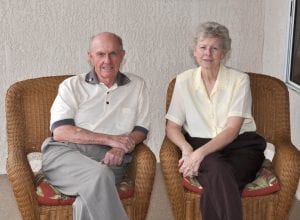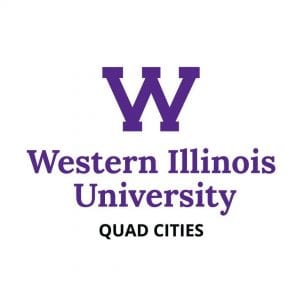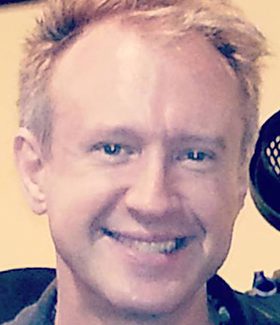Arlington & Arlene Seymour Center for Rural Education, Advocacy, Policy and Research Established at WIU
MACOMB/Moline, IL – Going back to its roots as a normal, or teaching, school, Western Illinois University has established the Arlington & Arlene Seymour Center for Rural Education, Advocacy, Policy and Research – the first center of its kind in Illinois and one of a few in the United States – to honor the commitment and dedication of two lifelong educators. In November 2020, the Illinois Board of Higher Education approved WIU as the site for the state’s rural education center.
The center, housed within the School of Education in the College of Education and Human Services, is made possible thanks to the generosity of Arlington (Arlie) Seymour, in memory of his late wife, Arlene.

Arlie and the late Arlene Seymour. Arlie recently made a gift to establish the Seymour Center in Arlene’s memory. The WIU center is the first of its kind in Illinois and one of a few in the United States.
The couple met in California in the early 1960s where they both were teaching. Arlie had graduated from WIU in 1953 and taught high school in Springfield, Illinois before heading to California in 1962. Arlene graduated from Michigan State, teaching in that state before moving to California in 1964. There they met, married and spent most of their careers in the San Jose Unified School District. The Seymours retired in 1993, with a combined 69 years of teaching spread over five decades.
When fully funded, the Center will offer partial and full tuition and fee scholarships to incoming students who wish to pursue careers in teaching K-12 and agree to stay in WIU’s 16-country service region to teach following graduation. The mission of the Seymour Center for Rural Education is to provide continuing support for the needs of rural educators in Illinois as well as at the state and national levels, according to Education Professor Eric C. Sheffield, who serves as the director of the School of Education.
“Arlie was so appreciative of his time at Western and the education and experiences that he received from Western that he left his retirement home in Sun City, Arizona and brought Arlene with him to live in Macomb for several years,” said Brad Bainter, executive officer of the WIU Foundation. “During their time back in Macomb Arlene adopted Western as her own college and both Arlie and Arlene could always be seen at athletic and cultural events on campus and in the community. Arlie also served on the foundation’s executive committee and became the president of the WIU Foundation. Eventually the Seymours moved back to Sun City West.
“Sadly, Arlene recently passed away, but I still enjoy my visits with Arlie when I get back to Arizona,” Bainter added. “It was most enjoyable hearing his story about the governor of Illinois attending his commencement which was held on the newly opened Hanson Field. Arlie and Arlene have made a pledge and a gift that will impact Western and education in our rural schools for many, many years to come and it comes at a very critical time for our rural region.”
The center’s mission will be realized through five sustainable priorities: develop a system to expand the teacher applicant pool for rural school districts in the region; provide advocacy, policy and research activities; develop a network for rural educators can partner with school districts; and advocate for rural education at the local, state and national level.
“The words of Arlie are so poignant … ‘We both worked our way through college, with modest help from our parents. This was true of the majority of college people of our generation, the ‘Depression babies. Need was a criterion for all of us. We have seen so many students in education fall through the cracks, and we wanted to help them.’ This quote reminds me of another quote by Emerson which states, ‘What lies behind you and what lies in front of you, pales in comparison to what lies inside of you.’ Our benefactors have internalized their experiences in such a way that what lies inside them has afforded them the opportunity to impact the lives of many to come,” said College of Education and Human Services Dean Francis Godwyll. “Their experiences resonate as my own experiences of how education became the great equalizer, leveling the playing field and opening opportunities for me that are life changing and transformational. I commend Mr. Seymour

WIU has had a Quad-Cities presence since 1912, and before moving to River Drive in Moline, was at 60th Street off John Deere Road.
for this generous gift and I promise that we will be good stewards of this gift through the Center.”
The Seymours’ commitment to WIU spans many years, including a $1 million planned gift they established in 1997 for the Arlington and Arlene Seymour Teacher Education Endowment to provide scholarships for students pursuing careers in teaching.
“We felt that Western provided a personal association for what we wanted to do with our estate for the immediate and long-term future,” said Arlie, when announcing the 1997 gift. “On visits to the campus and having our residence in Macomb from 2004 through 2008 reinforced our confidence in having made that choice.
We both worked our way through college, with modest help from our parents. This was true of the majority of college people of our generation, the ‘Depression babies. Need was a criteria for all of us,” he added. “We have seen so many students in education fall through the cracks, and we wanted to help them.”
Bainter added that the Seymours have given of their time and resources over the years without drawing attention to themselves, and this new center at Western Illinois University will provide students … and school districts in rural Illinois … added benefits for many years to come.
“The new Seymour Center for Rural Education, Advocacy, Policy and Research provides a unique opportunity to serve an area of education far too long overlooked: rural educational settings, which have all too often taken a back seat to issues concerning urban and suburban contexts in advocacy, policy, and research,” WIU Education Professor and Director of the School of Education Eric Sheffield added. “As the Seymour Center is the only such center in the state currently and one of a few in the nation of its kind, which demonstrates Western’s longstanding commitment and reputation to educating future teachers.”
According to Denny Barr, director of the Seymour Center, as an example of this important focus on rural education, one the Center will take up in a variety of ways, WIU’s School of Education faculty have submitted a grant proposal to the American Educational Research Association to support a conference to be hosted by the Center on the particular issues faced by rural second language students, their schools, and their teachers.
“The Rural EL student population is one of the fastest growing groups in our region; and yet, it remains one of the most under-researched educational contexts,” Barr explained. “The focus the Center will bring to rural educational contexts in addition the scholarships noted above, will, we believe, help in recruiting quality teachers to consider rural contexts.”
For more information about teacher education at WIU, visit wiu.edu/coehs/teacher/









